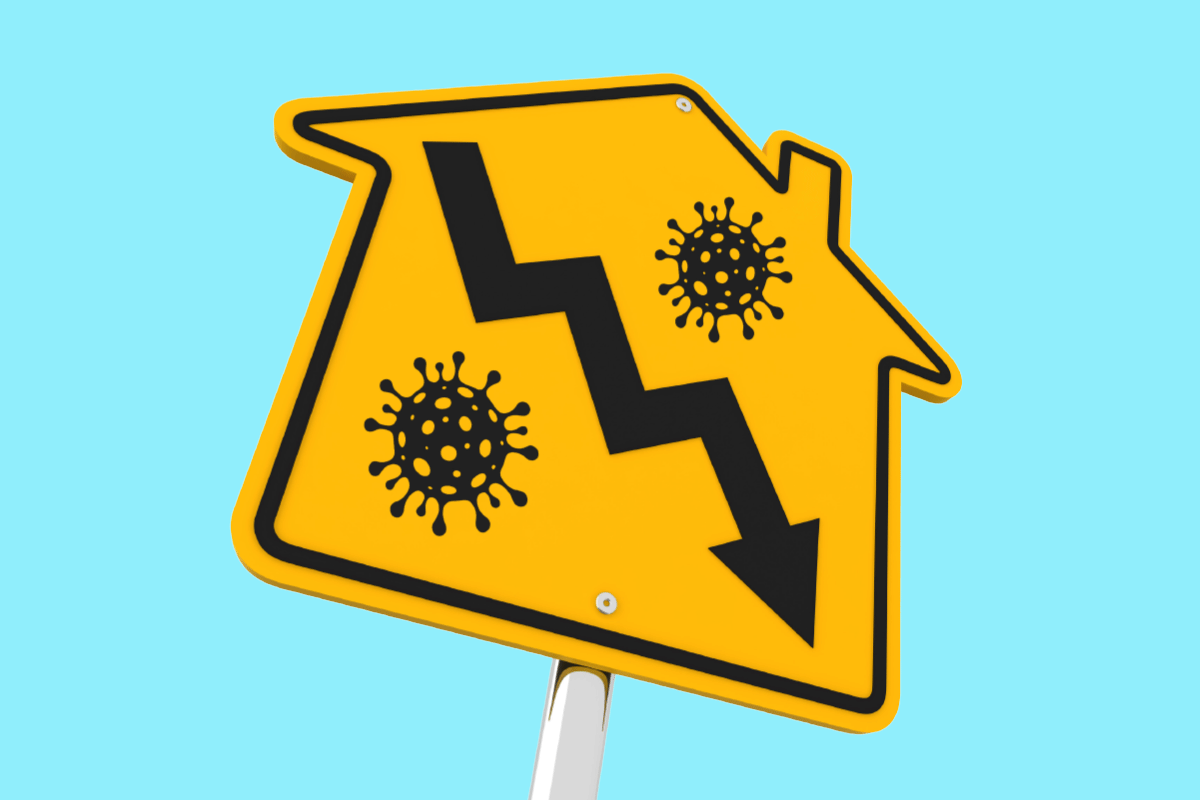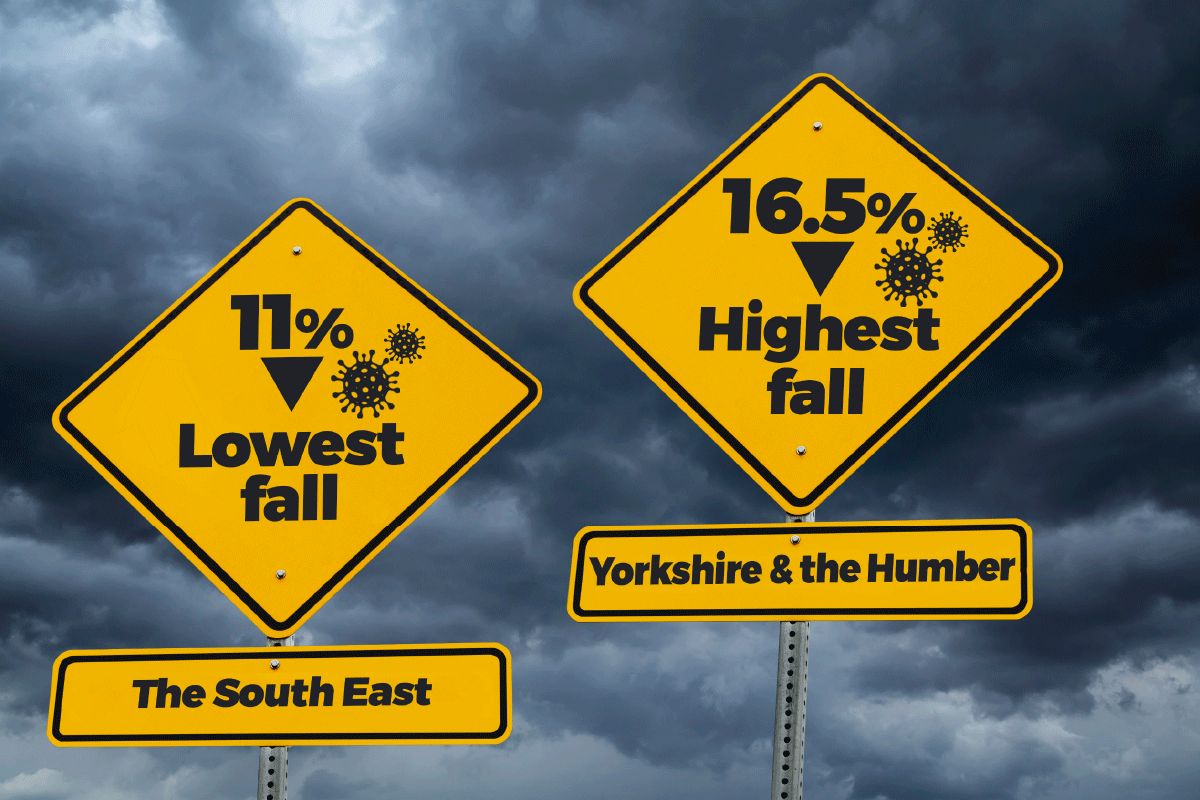Everything you need to know about post-pandemic property prices
Whether you are a first-time buyer or a homeowner looking to move, find out how a potential fall in hous…
26th May 2020 16:25
by Stephen Little from interactive investor
Whether you are a first-time buyer or a homeowner looking to move, find out how a potential fall in house prices could affect you.

The ban on viewing properties and moving home because of the coronavirus pandemic brought the housing market to a grinding halt.
Estate agents, buyers and surveyors were banned from visiting properties, and around £82 billion in house sales were put on hold.
While the Government has now eased these rules, allowing the housing market to start up again, predictions for house prices are grim.
Is a crash on its way?
Shutting down the economy has caused a huge reduction in the demand for goods and services, with figures from the Centre for Economics and Business Research (CEBR) showing that the lockdown has shrunk the economy by 31%.
Some experts are predicting steep falls knocking more than £30,000 off the average house price as the long-term economic impact takes its toll.
CEBR forecasts that UK house prices will fall by 13% by the end of 2020, pushing the average house price below £200,000. It says the drop will be driven by a lack of transactions, high uncertainty and falling incomes.
Alastair Neame, senior economist at CEBR, believes the private rented sector could be the catalyst of the impending housing crash.
He says: “Those most at risk of unemployment tend to be young people living in the rental sector.
"If they lose their jobs and can’t afford to pay their rent this could have a knock-on effect on landlords who could be forced to cash in.”
However, not all experts are predicting such a dramatic impact on property prices.
Before the coronavirus pandemic took hold, estate agent Savills expected property prices to rise by 1% this year, but it has now revised its forecast.
Lucian Cook, its head of research, says that house prices could fall between 5% and 10% depending on how badly the economy is hit.
Since the lockdown was introduced, the economy has taken a pounding. However, economists believe this downturn is different to previous ones in 1990 and 2007.
Many economists are forecasting a sharp V-shaped downturn, which means that the economy could rebound quickly.
Cook says the Government’s swift action to protect jobs and earnings, low interest rates and stricter affordability checks will help limit house price falls.
“Clearly there will be a big impact on the economy, but with interest rates staying low it should be a short, sharp shock,” he says. “Transaction levels will begin to pick up once buyers and sellers overcome the practical difficulties in moving.
“It will take time for people to become more confident about their personal finances and job security, but once this happens, we will likely see stronger house price growth.”
Howard Archer, chief economic advisor to the EY ITEM Club, believes it is doubtful house prices will return to the near record highs of early this year until well into 2021.
He says: “It is likely that house prices will initially still continue to fall and could well drop around 5% over the coming months.
“We predict that the housing market will start to edge back up in the fourth quarter and then gain further in 2021.”
Will price falls vary across the UK?

CEBR says that house prices in some regions could fall more than others because the loss of jobs and incomes will not be evenly spread across the country.
It says areas with workers in manufacturing, construction, retail, accommodation and hospitality are likely to be hit the worst due to the impact of social distancing measures.
Yorkshire and the Humber and Northern Ireland have the highest shares of employment within these industries and both could see house prices plummet by 16%.
Regional house price changes for 2020
Region/Nation | Price change |
North East | -13.50% |
North West | -16.00% |
Yorkshire and the Humber | -16.50% |
East Midlands | -12.50% |
West Midlands | -16.00% |
East of England | -16.25% |
London | -11.25% |
South East | -11.00% |
South West | -13.00% |
Scotland | -10.50% |
Wales | -14.50% |
Northern Ireland | -16.50% |
TOTAL | -13.00% |
Source: CEBR 5 May
However, Tom Bill, head of London residential research at estate agent Knight Frank, is not so sure.
He says: “We are seeing a price renegotiation between buyers and sellers, with 5% to 10% being taken off to adjust for a generalised perceived risk of Covid-19.
“We don’t expect a huge amount of differentiation in house price changes between the regions. If there are hotspots of unemployment, this might have an impact, but beyond that you will have to look at the relative performance of house prices in recent years.”
Knight Frank predicts house prices will fall by 3% across the UK during 2020 but that market activity will pick up once pent-up demand is released.
Bill says when the market recovers next year, house prices will rise by 5%.
“We expect London house prices to recover more quickly than the rest of the country. This is because you have a broader range of international demands and some buyers who are going to benefit from the low value of the pound.”
Will it help first-time buyers?
If you think that a fall in prices will be good for first-time buyers, then think again.
On the face of it a fall in house prices should be good for people looking to get on the property ladder. However, it is unlikely to create opportunities for first-time buyers as the downturn in the economy means banks and building societies are less likely to lend.
Hansen Lu, an economist at Capital Economics, expects house prices to drop 4% as a result of the pandemic.
He says: “We have to remember that house price falls are essentially coming from an economic catastrophe.
“There will be opportunities for some people who still have jobs and are lucky to have deposits and savings to buy a property. However, there won’t be a clear benefit for first-time buyers as a group – the economic impact of the virus means many people will lose their jobs.”
The number of lower deposit mortgages has also plummeted, making it more difficult for first-time buyers.
First-time buyers often take out mortgages of 90% or 95% loan to value (LTV), but lenders have been pulling these as they are riskier.
Lu says: “Lenders are cutting the availability of high LTV mortgages and first-time buyers tend to benefit from these more than others because they have lower savings.”
Will the market get a boost?
Property experts believe the housing market could be reignited if the Government offers a stamp duty holiday as part of a stimulus package.
Home buyers must pay stamp duty on properties worth more than £125,000, although there is relief for first-time buyers.
Knight Frank says a stamp duty holiday would aid buyers whose finances have been hit by the slowdown in the economy because of the coronavirus.
The move is also backed by RICS, which believes a stamp duty holiday could be used as a short-term measure to boost the property market once the pandemic is over.
Bill says any change to stamp duty would help boost the housing market.
“Material cuts in stamp duty or a holiday would improve liquidity in the housing market as well as having a knock-on effect for the whole economy.”
However, while a stamp duty holiday would be welcomed by homeowners, is unlikely due to the impact it would have on tax receipts for the Treasury.
Knight Frank also says that expanding the Help to Buy scheme could give developers the confidence to progress projects in a slower moving market following the drop in transactions.
Meanwhile, a review of the conveyancing process could also help kick-start the housing market. Instead of relying on pen and paper, conveyancers would focus on implementing new technology.
Could homeowners suffer negative equity?
If house prices fall, this could leave buyers in negative equity. This is where the value of your home is less than the value of the mortgage you are paying off.
If you fall into negative equity, you will not be able to sell your existing property and buy an equivalent or more expensive property unless you have extra savings. You could also miss out on some of the best mortgage deals when your current rate ends with your existing lender.
People with a high LTV of 90% or more are most likely to experience negative equity if house prices fall.
David Hollingworth, associate director at L&C Mortgages, says: “If you are not planning to sell and can still afford the mortgage, you are in a good position to ride the situation out. It is only if you decide to sell your home that you potentially risk suffering a loss.
“One way you can protect yourself against negative equity is by overpaying your mortgage. That way, you are reducing your mortgage more quickly than the property value.
“If you are in negative equity, switching to a new lender is likely to be impossible. Having said that, you may still be able to switch on to a deal with your existing lender.”
This article was originally published in our sister magazine Moneywise, which ceased publication in August 2020.
These articles are provided for information purposes only. Occasionally, an opinion about whether to buy or sell a specific investment may be provided by third parties. The content is not intended to be a personal recommendation to buy or sell any financial instrument or product, or to adopt any investment strategy as it is not provided based on an assessment of your investing knowledge and experience, your financial situation or your investment objectives. The value of your investments, and the income derived from them, may go down as well as up. You may not get back all the money that you invest. The investments referred to in this article may not be suitable for all investors, and if in doubt, an investor should seek advice from a qualified investment adviser.
Full performance can be found on the company or index summary page on the interactive investor website. Simply click on the company's or index name highlighted in the article.